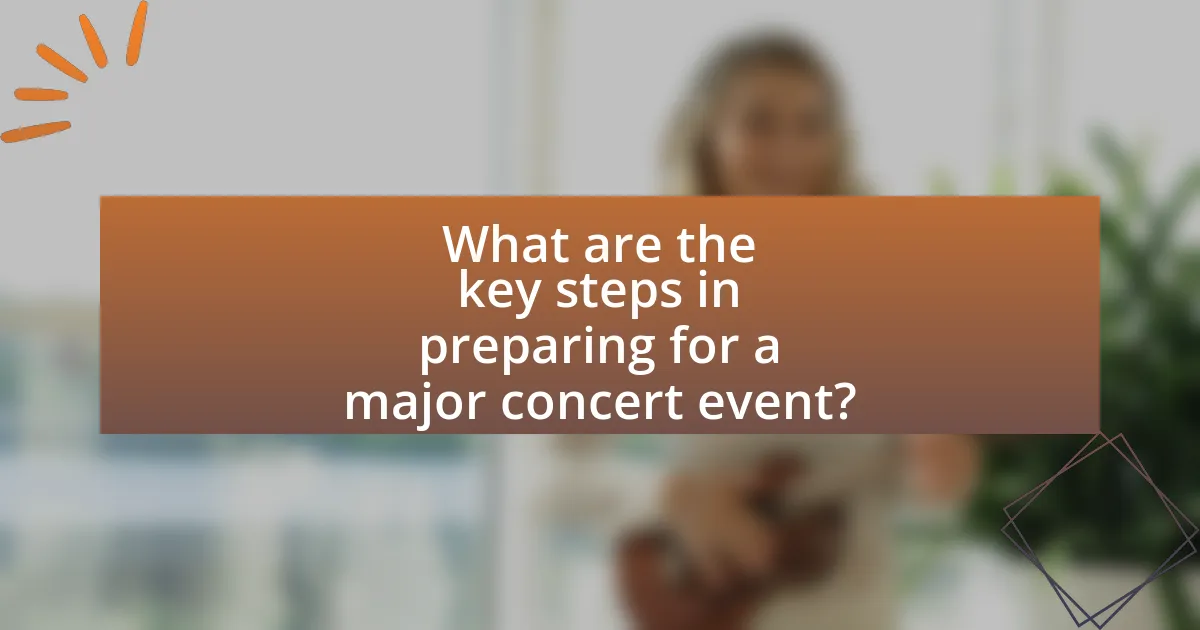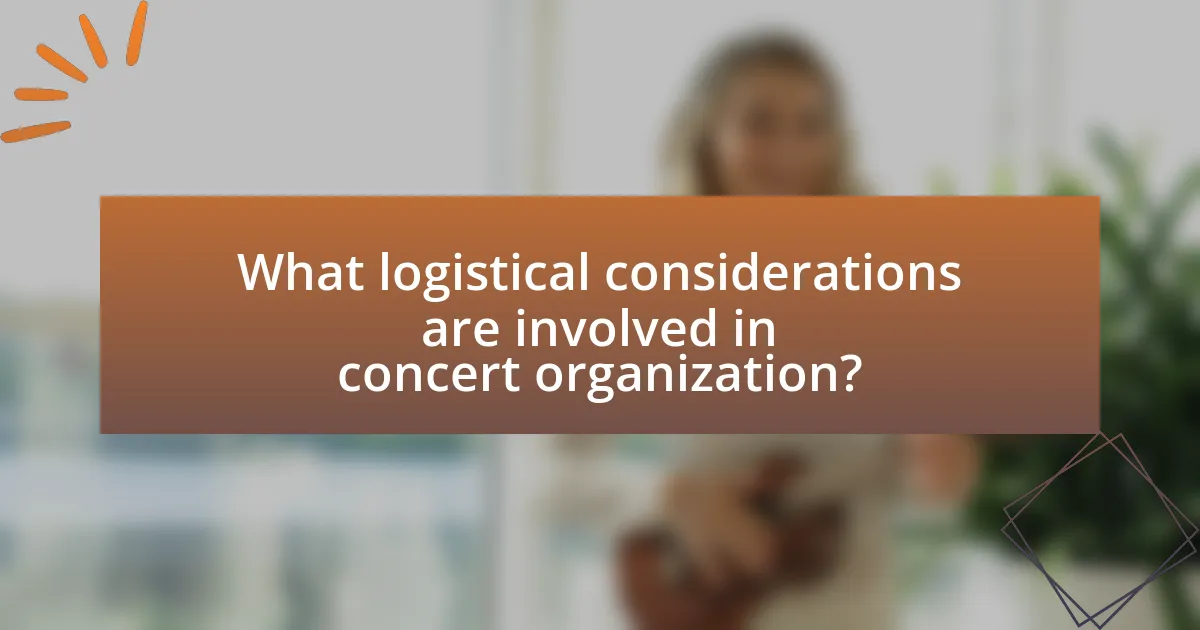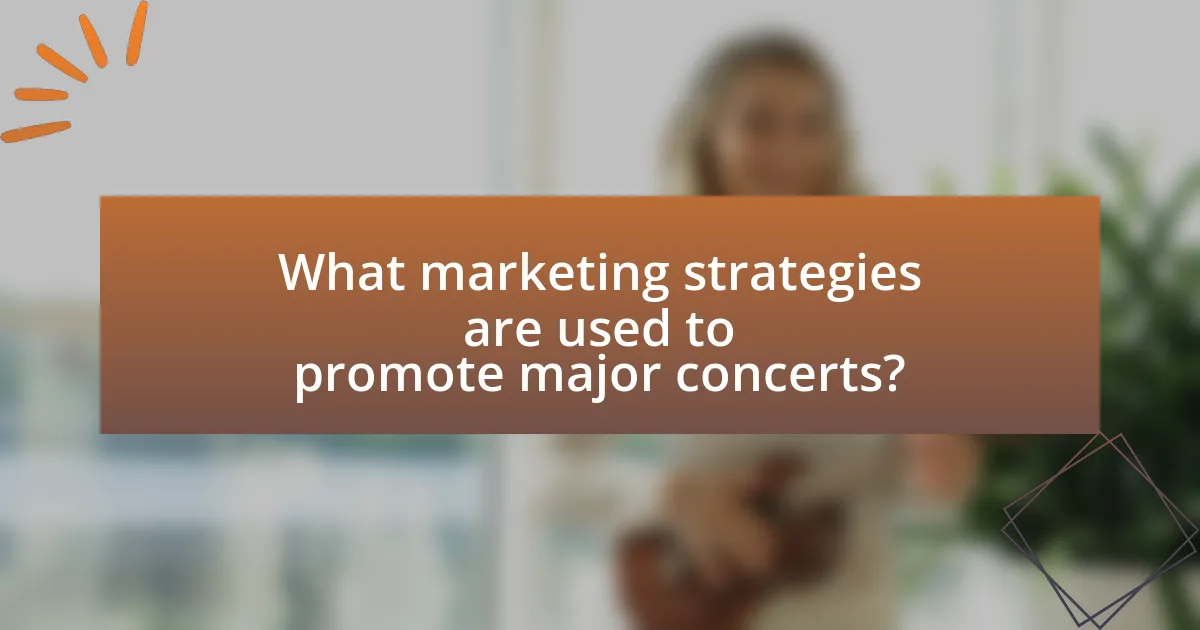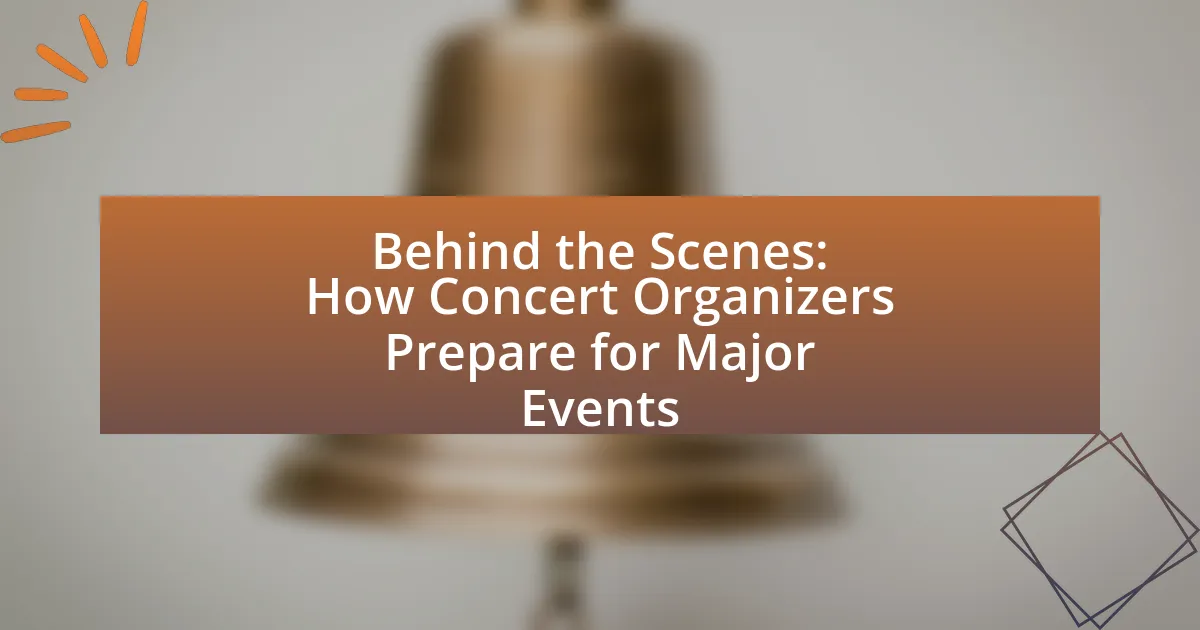The article focuses on the essential steps concert organizers take to prepare for major events, detailing the processes involved in securing venues, booking artists, coordinating logistics, and promoting the concert. It examines how venue selection is influenced by factors such as capacity, location, and acoustics, and discusses the critical role of budgeting in managing costs and ensuring financial feasibility. Additionally, the article highlights the importance of logistical considerations, technical requirements, safety measures, and effective marketing strategies in creating a successful concert experience. Through a comprehensive overview, it provides insights into the complexities of concert organization and the best practices for overcoming common challenges.

What are the key steps in preparing for a major concert event?
The key steps in preparing for a major concert event include securing the venue, booking artists, coordinating logistics, and promoting the event. Securing the venue involves selecting an appropriate location that meets capacity and technical requirements, often requiring contracts and permits. Booking artists entails negotiating contracts with performers and their management, ensuring availability and technical needs are met. Coordinating logistics includes arranging sound, lighting, and stage setup, as well as managing transportation and accommodations for artists and crew. Promoting the event involves marketing strategies such as social media campaigns, press releases, and ticket sales to ensure audience attendance. Each of these steps is critical for the successful execution of a major concert event.
How do concert organizers determine the venue for an event?
Concert organizers determine the venue for an event by evaluating factors such as capacity, location, acoustics, and available amenities. They assess the expected audience size to ensure the venue can accommodate attendees comfortably, often referencing historical attendance data from similar events. The location is chosen based on accessibility for the target audience, considering transportation options and local demographics. Acoustics are critical for sound quality, leading organizers to select venues known for their superior sound characteristics. Additionally, available amenities like parking, concessions, and technical support are factored in to enhance the overall experience for both artists and attendees.
What factors influence the choice of venue for a concert?
The choice of venue for a concert is influenced by factors such as capacity, location, acoustics, and budget. Capacity determines how many attendees can be accommodated, which directly impacts ticket sales and revenue. Location affects accessibility for the audience, including proximity to public transport and parking facilities. Acoustics are crucial for sound quality, as venues with poor acoustics can diminish the concert experience. Budget constraints dictate the affordability of the venue, including rental fees and additional costs for services like security and equipment. These factors collectively guide concert organizers in selecting the most suitable venue for their events.
How does venue capacity affect ticket sales and audience experience?
Venue capacity directly influences ticket sales and audience experience by determining the number of tickets available and the overall atmosphere of the event. A larger venue can accommodate more attendees, potentially leading to higher ticket sales; for example, stadiums can sell tens of thousands of tickets, maximizing revenue. Conversely, smaller venues create an intimate setting that enhances audience engagement and enjoyment, as seen in studies showing that audiences often prefer smaller, more personal experiences. Additionally, overcrowding in large venues can lead to discomfort, negatively impacting the audience experience, while well-managed smaller venues can foster a sense of community and connection among attendees.
What role does budgeting play in concert preparation?
Budgeting plays a critical role in concert preparation by determining the financial feasibility and resource allocation for the event. Effective budgeting allows concert organizers to outline expenses such as venue rental, artist fees, equipment, marketing, and staffing, ensuring that all necessary components are funded. For instance, a study by the Event Management Association indicates that 70% of successful events adhere to a strict budget, which helps prevent overspending and financial losses. Thus, a well-structured budget not only guides decision-making but also enhances the overall success of the concert by ensuring that all aspects are adequately financed and managed.
How do organizers estimate costs for a major concert?
Organizers estimate costs for a major concert by analyzing various expense categories, including venue rental, artist fees, production costs, staffing, and marketing. They typically create a detailed budget that outlines these categories, often using historical data from previous events to project costs accurately. For instance, a study by the Event Management Association indicates that venue costs can account for up to 30% of the total budget, while artist fees may represent another significant portion, sometimes exceeding 50% for high-profile acts. By gathering quotes from vendors and suppliers, organizers can refine their estimates, ensuring they account for all potential expenses and avoid budget overruns.
What are the common financial pitfalls to avoid in concert planning?
Common financial pitfalls to avoid in concert planning include underestimating costs, neglecting to budget for unforeseen expenses, and failing to secure adequate funding. Underestimating costs can lead to financial shortfalls, as many organizers overlook expenses such as venue fees, artist fees, and production costs. Neglecting to budget for unforeseen expenses, which can account for 10-20% of total costs, can result in significant financial strain. Additionally, failing to secure adequate funding, whether through ticket sales, sponsorships, or grants, can jeopardize the entire event. According to a study by the Event Safety Alliance, 70% of concert organizers reported financial losses due to inadequate financial planning.
How do concert organizers select artists and performers?
Concert organizers select artists and performers based on a combination of factors including audience appeal, genre relevance, budget constraints, and logistical considerations. They analyze market trends and audience demographics to identify artists who will attract ticket sales and enhance the event’s overall experience. Additionally, organizers often consider the artist’s past performance history, social media presence, and fan engagement metrics to gauge their popularity and potential draw. For instance, a study by Pollstar indicates that artists with higher social media engagement tend to sell more tickets, reinforcing the importance of digital presence in selection criteria.
What criteria are used to choose the right artists for an event?
The criteria used to choose the right artists for an event include the artist’s popularity, genre alignment with the event theme, performance history, audience demographics, and budget considerations. Popularity ensures that the artist can draw a crowd, while genre alignment guarantees that the music resonates with the intended audience. Performance history provides insight into the artist’s reliability and stage presence, which are crucial for live events. Audience demographics help organizers select artists who appeal to the specific target group, enhancing overall satisfaction. Budget considerations are essential to ensure that the artist’s fees align with the event’s financial constraints. These criteria collectively ensure a successful event that meets both organizational goals and audience expectations.
How does artist availability impact concert scheduling?
Artist availability directly influences concert scheduling by determining when and where performances can occur. Concert organizers must align their event dates with the artists’ touring schedules, which can be complex due to multiple commitments, including other concerts, recording sessions, and personal obligations. For instance, if a popular artist is booked for a festival on a specific date, organizers must either adjust their event to accommodate the artist’s availability or select a different performer. This necessity for synchronization often leads to a limited window for scheduling, impacting venue selection and ticket sales. Additionally, artist availability can affect the overall lineup, as the presence of high-demand artists can attract larger audiences, making their scheduling a priority for concert organizers.

What logistical considerations are involved in concert organization?
Logistical considerations in concert organization include venue selection, equipment rental, transportation, staffing, and scheduling. Venue selection involves assessing capacity, location, and accessibility to ensure it meets audience needs and safety regulations. Equipment rental requires sourcing sound systems, lighting, and staging, which must be coordinated to arrive on time and function properly. Transportation logistics involve planning for the movement of artists, crew, and equipment, often necessitating contracts with transport services. Staffing considerations include hiring security, technical crew, and volunteers, ensuring adequate training and communication. Scheduling is critical, as it encompasses the timing of performances, rehearsals, and load-in/load-out times, which must align with all other logistical elements to ensure a smooth event.
How do organizers manage transportation and accommodation for artists?
Organizers manage transportation and accommodation for artists by coordinating logistics through detailed planning and communication with service providers. They typically book flights, ground transportation, and hotel accommodations well in advance to ensure availability and convenience. Organizers often use contracts with transportation companies and hotels to secure favorable rates and conditions, which helps streamline the process. Additionally, they may create itineraries that outline travel schedules and accommodation details, ensuring that artists have a clear understanding of their arrangements. This systematic approach minimizes delays and enhances the overall experience for the artists involved in the event.
What are the best practices for arranging artist travel logistics?
The best practices for arranging artist travel logistics include thorough planning, clear communication, and attention to detail. Concert organizers should create a comprehensive travel itinerary that outlines flight details, accommodation, transportation, and schedules. This ensures that artists have a seamless travel experience. Additionally, maintaining open lines of communication with artists and their management teams is crucial for addressing any last-minute changes or special requests. Organizers should also consider the specific needs of each artist, such as dietary restrictions or preferred travel arrangements, to enhance their comfort. Utilizing reliable travel agencies or logistics companies can further streamline the process, as they often have established relationships with airlines and hotels, which can lead to better rates and accommodations.
How do accommodation choices affect artist performance?
Accommodation choices significantly impact artist performance by influencing their comfort, well-being, and overall readiness for events. For instance, high-quality accommodations with amenities such as soundproof rooms, comfortable beds, and access to healthy food can enhance an artist’s rest and recovery, leading to improved vocal performance and stage presence. Research indicates that artists who stay in supportive environments report lower stress levels and higher satisfaction, which correlates with better audience engagement and performance quality. Therefore, the selection of appropriate accommodations is crucial for optimizing artist performance during major events.
What technical requirements must be addressed for a successful concert?
Successful concerts require addressing several technical requirements, including sound quality, lighting, staging, and equipment setup. Sound quality is critical, necessitating high-quality audio systems, microphones, and monitors to ensure clear and balanced sound for both performers and the audience. Lighting must be designed to enhance the performance, utilizing various fixtures and control systems to create the desired atmosphere. Staging involves the physical setup of the performance area, including the stage design and layout, which must accommodate performers and equipment safely and effectively. Additionally, proper equipment setup and testing are essential to prevent technical failures during the event. These elements collectively contribute to a seamless concert experience, as evidenced by industry standards and practices that prioritize these technical aspects for successful live performances.
How do sound and lighting setups impact the concert experience?
Sound and lighting setups significantly enhance the concert experience by creating an immersive environment that engages the audience. High-quality sound systems ensure clarity and balance of music, allowing attendees to appreciate the nuances of the performance, while effective lighting design complements the music, setting the mood and emphasizing key moments. Research indicates that well-executed sound and lighting can increase audience satisfaction and emotional response, as evidenced by studies showing that 70% of concertgoers rate sound quality as a critical factor in their overall enjoyment.
What equipment is essential for different types of concerts?
Essential equipment for different types of concerts includes sound systems, lighting rigs, and staging. Sound systems, which consist of microphones, speakers, and mixing consoles, are crucial for amplifying the performance and ensuring clear audio for the audience. Lighting rigs enhance the visual experience, using various types of lights such as spotlights, LED panels, and fog machines to create atmosphere and highlight performers. Staging equipment, including platforms, risers, and backdrops, provides a physical space for artists to perform and can be customized based on the concert’s theme or venue size. Each type of concert, whether it be a rock show, classical performance, or electronic festival, may require specific variations of this equipment to meet the unique demands of the genre and audience expectations.
How do concert organizers ensure safety and security at events?
Concert organizers ensure safety and security at events by implementing comprehensive risk management strategies that include thorough planning, coordination with law enforcement, and the deployment of trained security personnel. They conduct detailed assessments of the venue to identify potential hazards and establish emergency response plans. For instance, according to the Event Safety Alliance, 70% of event organizers report that having a clear security plan significantly reduces risks. Additionally, organizers often utilize technology such as surveillance cameras and metal detectors to enhance security measures, ensuring a safer environment for attendees.
What measures are taken to manage crowd control effectively?
Effective crowd control measures include strategic planning, trained personnel, and technology utilization. Concert organizers implement crowd management plans that outline entry and exit points, designated areas for different activities, and emergency protocols. Trained security staff monitor crowd behavior and ensure compliance with safety regulations. Additionally, technology such as surveillance cameras and crowd monitoring software helps track crowd density and movement, allowing for real-time adjustments. These measures are supported by industry standards and best practices, ensuring safety and enhancing the overall experience for attendees.
How do emergency protocols influence concert planning?
Emergency protocols significantly influence concert planning by establishing safety measures that ensure the well-being of attendees, staff, and performers. These protocols dictate the design of venue layouts, the allocation of security personnel, and the development of evacuation plans. For instance, venues must comply with local regulations that require clear emergency exits and accessible routes, which directly impacts how seating and staging are arranged. Additionally, emergency protocols necessitate coordination with local law enforcement and emergency services, ensuring that response times are optimized in case of incidents. This structured approach to safety not only mitigates risks but also enhances the overall experience for concert-goers, as they can enjoy the event with greater peace of mind knowing that their safety is prioritized.

What marketing strategies are used to promote major concerts?
Major concerts are promoted using a combination of digital marketing, social media engagement, traditional advertising, and partnerships. Digital marketing strategies include targeted online ads on platforms like Google and Facebook, which allow organizers to reach specific demographics based on user data. Social media engagement involves creating buzz through platforms such as Instagram and Twitter, where artists and promoters share content, countdowns, and behind-the-scenes glimpses to build excitement. Traditional advertising methods, including billboards, radio spots, and print media, still play a role in reaching broader audiences. Additionally, partnerships with local businesses and influencers can enhance visibility and credibility, as seen in successful campaigns for events like Coachella, which leverage collaborations to attract diverse attendees.
How do organizers create effective promotional campaigns?
Organizers create effective promotional campaigns by utilizing targeted marketing strategies that engage specific audiences. They conduct market research to identify demographics and preferences, allowing them to tailor messaging and channels accordingly. For instance, using social media platforms like Instagram and Facebook, organizers can reach younger audiences effectively, as studies show that 71% of users are under 35 years old. Additionally, they often collaborate with influencers to amplify their reach, leveraging the trust and engagement these figures have with their followers. By analyzing data from previous events, organizers can refine their approaches, ensuring that promotional efforts resonate with potential attendees and maximize ticket sales.
What channels are most effective for reaching concert-goers?
Social media platforms are the most effective channels for reaching concert-goers. Research indicates that 79% of concert attendees discover events through social media, particularly Facebook and Instagram, which are widely used for event promotion and audience engagement. Additionally, email marketing remains a strong channel, with a reported 20% higher ticket sales when targeted emails are sent to potential attendees. These channels not only facilitate direct communication but also allow for targeted advertising, enhancing the likelihood of reaching the desired audience effectively.
How does social media influence concert marketing efforts?
Social media significantly influences concert marketing efforts by enhancing audience engagement and expanding reach. Platforms like Facebook, Instagram, and Twitter allow concert organizers to promote events directly to targeted demographics, facilitating real-time interaction and feedback. According to a 2021 study by Eventbrite, 80% of event organizers reported that social media was their most effective marketing tool, highlighting its role in driving ticket sales and increasing brand awareness. Additionally, user-generated content, such as posts and shares from attendees, amplifies visibility and creates a sense of community around the event, further boosting interest and attendance.
What role do partnerships and sponsorships play in concert promotion?
Partnerships and sponsorships are crucial in concert promotion as they provide financial support, enhance marketing reach, and improve overall event credibility. Financially, sponsors often cover costs such as venue rental, artist fees, and production expenses, which can significantly reduce the financial risk for organizers. Additionally, partnerships with brands can leverage their existing customer bases, allowing for broader promotional efforts through co-branded marketing campaigns. For instance, a study by the Event Marketing Institute found that 74% of consumers are more likely to purchase a product after attending an event sponsored by a brand, demonstrating the effectiveness of sponsorships in driving ticket sales and brand engagement.
How can sponsors enhance the concert experience for attendees?
Sponsors can enhance the concert experience for attendees by providing interactive activations and exclusive perks. These activations, such as photo booths, merchandise giveaways, or immersive brand experiences, engage attendees and create memorable moments. For instance, a study by Eventbrite found that 78% of attendees appreciate interactive experiences at events, which can lead to increased satisfaction and brand loyalty. Additionally, sponsors can offer exclusive access to VIP areas, meet-and-greet opportunities with artists, or early entry to the venue, further enriching the overall experience. This strategic involvement not only elevates the concert atmosphere but also strengthens the connection between the brand and the audience.
What are the benefits of collaborating with local businesses for promotion?
Collaborating with local businesses for promotion offers enhanced community engagement and increased visibility. This partnership allows concert organizers to tap into the established customer base of local businesses, thereby reaching a wider audience. For instance, a study by the Local Initiatives Support Corporation found that local collaborations can increase event attendance by up to 30%, as businesses promote events through their networks. Additionally, local businesses often provide resources or sponsorships, which can reduce promotional costs and enhance the overall event experience.
What are the best practices for troubleshooting common concert issues?
The best practices for troubleshooting common concert issues include thorough pre-event planning, effective communication among team members, and having contingency plans in place. Pre-event planning involves conducting detailed checks on equipment, venue logistics, and artist requirements to identify potential problems early. Effective communication ensures that all team members are aware of their roles and can quickly address any issues that arise during the event. Contingency plans, such as backup equipment and alternative arrangements for weather-related disruptions, are crucial for minimizing the impact of unforeseen circumstances. These practices are supported by industry standards, which emphasize the importance of preparation and adaptability in live event management.
How can organizers prepare for unexpected challenges during an event?
Organizers can prepare for unexpected challenges during an event by developing a comprehensive contingency plan that addresses potential risks. This plan should include identifying possible challenges such as weather disruptions, technical failures, or security issues, and outlining specific responses for each scenario. For instance, having backup equipment and a technical support team on standby can mitigate the impact of equipment failure. Additionally, conducting thorough risk assessments prior to the event allows organizers to anticipate issues and allocate resources effectively. Research indicates that events with well-defined contingency plans experience 30% fewer disruptions, highlighting the importance of proactive preparation.
What strategies can be employed to handle last-minute changes effectively?
To handle last-minute changes effectively, concert organizers should implement flexible planning, establish clear communication channels, and maintain a contingency budget. Flexible planning allows organizers to adapt quickly to unforeseen circumstances, such as artist cancellations or venue issues. Clear communication channels ensure that all team members are informed and can respond promptly to changes, minimizing confusion and delays. A contingency budget provides financial resources to address unexpected costs, enabling organizers to make necessary adjustments without compromising the event’s quality. These strategies are supported by industry practices, where successful event management often relies on adaptability and proactive problem-solving.
